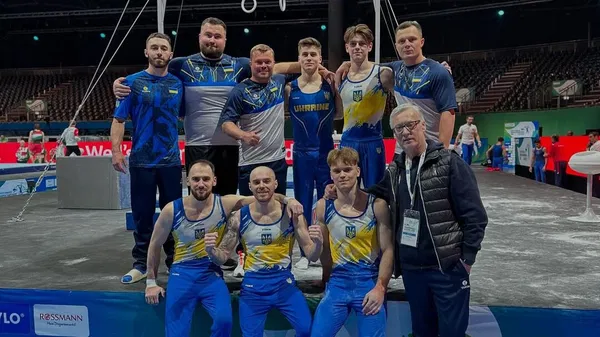
Ukraine’s Gymnastics Hopes Crumble Amid Coaching Controversy and Chaotic Preparation
Illia Kovtun, Oleg Verniaiev, Nazar Chepurnyi, Ihor Radivilov, and Radomyr Stelmakh, under the leadership of head coach Gennady Sartynskyi, once led Ukraine to a historic triumph at the 2024 European Artistic Gymnastics Championships in Rimini, Italy. There, they pulled off a dramatic win against Great Britain, overcoming a deficit in the final rotation to clinch the title with a score of 255.762—edging their rivals by just 0.333 points. Ukraine concluded the tournament with six medals: three gold, two silver, and one bronze.
But the story took a turn in 2025. As defending champions, expectations were high—but Ukraine delivered a disappointing performance. The only medal they managed to secure was a bronze in the vault, earned by Nazar Chepurnyi with a score of 14.583. So, what went wrong?
According to their coach Gennady Sartynskyi, the team didn’t perform at its peak, but considering the challenges leading up to the event, he believed they did reasonably well. He acknowledged a few falls but stressed that the circumstances during training were far from ideal.
One of the main factors disrupting their preparation was Sartynskyi’s own suspension. In early May, the Ukrainian team had even considered boycotting the European Championships over this issue. The suspension stemmed from a conflict between Sartynskyi and the vice president of the Gymnastics Federation of Ukraine, Stella Zakharova. It was only after intervention from Ukraine’s Ministry of Youth and Sports that Sartynskyi was allowed to support the athletes remotely—offering guidance over the phone during their training sessions.
Oleg Verniaiev highlighted how disruptive this situation was. Speaking to a Ukrainian outlet, he explained that the uncertainty and constant interruptions deeply affected the team’s preparation. “It was the hardest training period I’ve ever had,” he said, noting that the coach spent nearly half of their training sessions handling phone calls rather than focusing on the gymnasts. The confusion over whether they would even attend the championship added to the stress.
Nazar Chepurnyi echoed these frustrations. He pointed out that the typical structure of preparing for competition—analyzing performance, setting goals, and training under a coach’s direction—was completely absent. The late confirmation of their participation, less than two weeks before the event, meant the athletes were left in limbo, unsure of their status or even who would coach them. Chepurnyi admitted that the idea of boycotting the event was originally his, and the rest of the team supported it.
These internal struggles reflect a broader issue within the sport—growing coaching controversies across the gymnastics world.
In Azerbaijan, long-time rhythmic gymnastics coach Mariana Vasileva was banned for life from serving as head coach in any FIG-affiliated organization. She also received an eight-year ban from all FIG activities, following allegations of physical and psychological abuse, coercive behavior, and inappropriate conduct toward athletes. Her daughter, Siyana Vasileva, also faced an 18-month ban, with a three-year probation period.
In France, Dimitru Pop, a coach for the women’s national artistic gymnastics team, was suspended pending investigation into allegations of abuse and mistreatment of athletes—an investigation that came just months before the Paris 2024 Olympics. The case remains unresolved.
In Russia, Irina Viner, one of the most decorated rhythmic gymnastics coaches, was suspended for two years by the Gymnastics Ethics Foundation. Her suspension followed public criticisms of Olympic judges after Israeli gymnast Linoy Ashram won gold over Russia’s Dina Averina in Tokyo 2020. Viner’s remarks, which accused the judges of bias and described the result as disgraceful, were deemed unethical. She also faced consequences for retaliating against a Russian FIG official and failing to cooperate with the investigation.
These controversies point to a deeper issue within gymnastics: when coaching disputes, administrative conflicts, and unresolved misconduct overshadow athletic performance, the athletes inevitably pay the price. For Ukraine, the consequences were clear—disrupted preparation, uncertainty, and a performance that fell far below their championship standard.